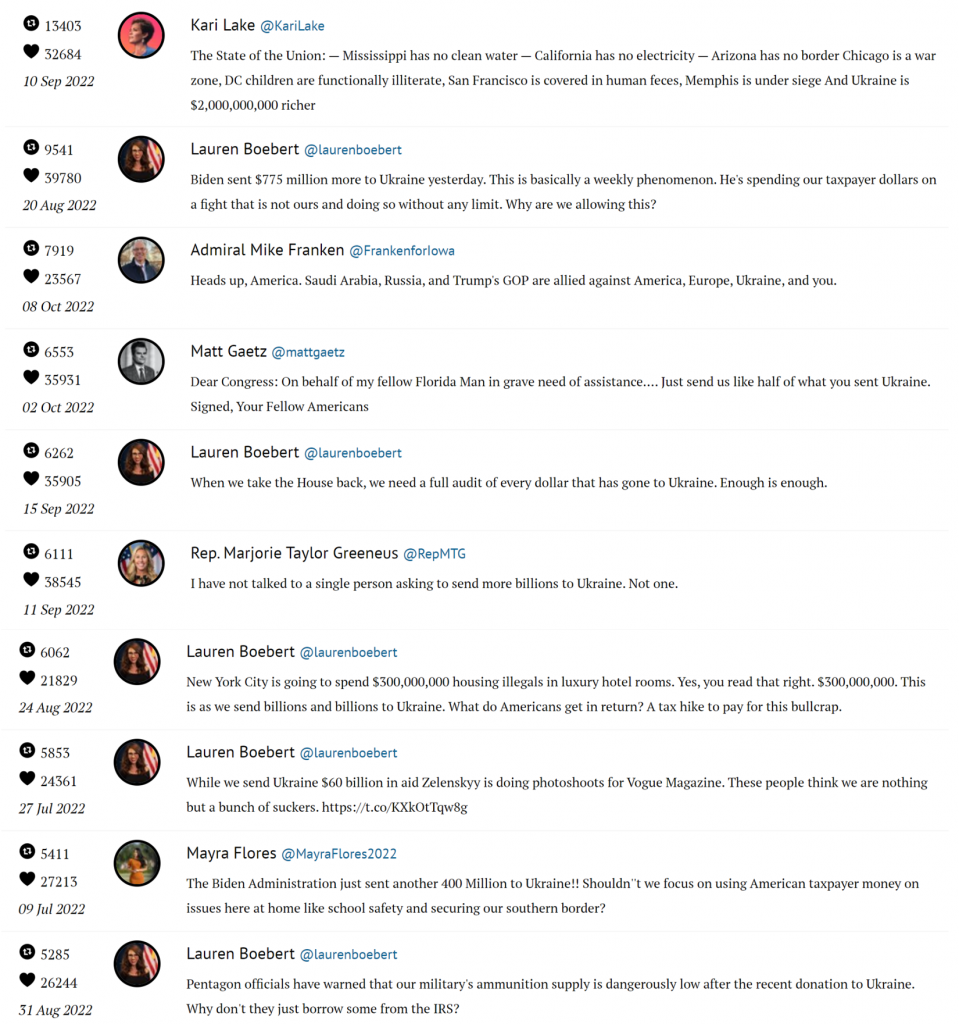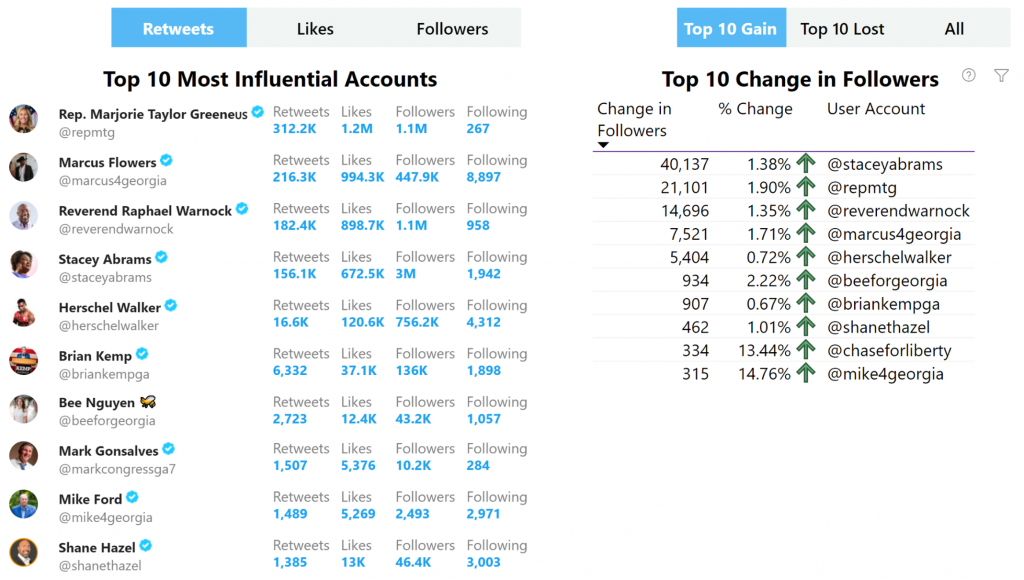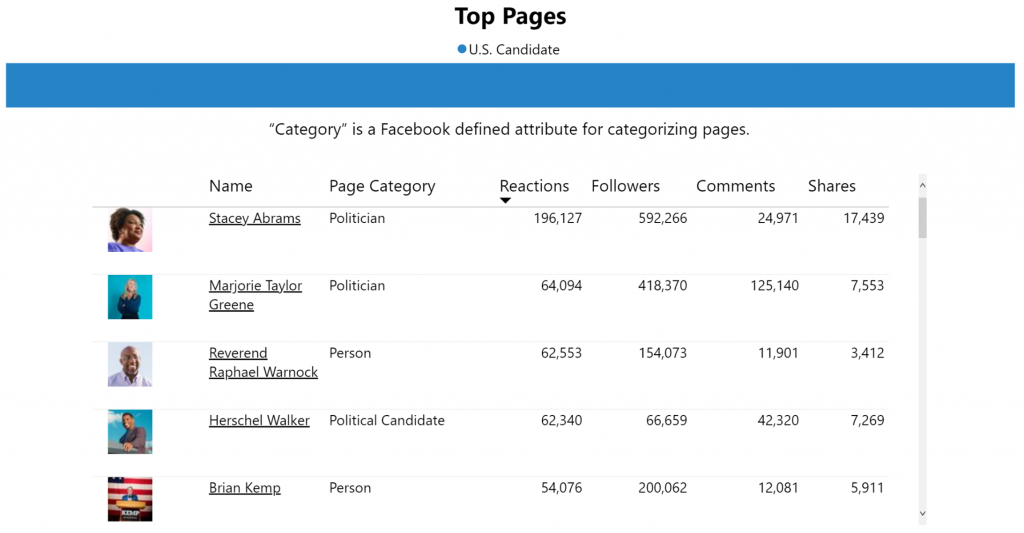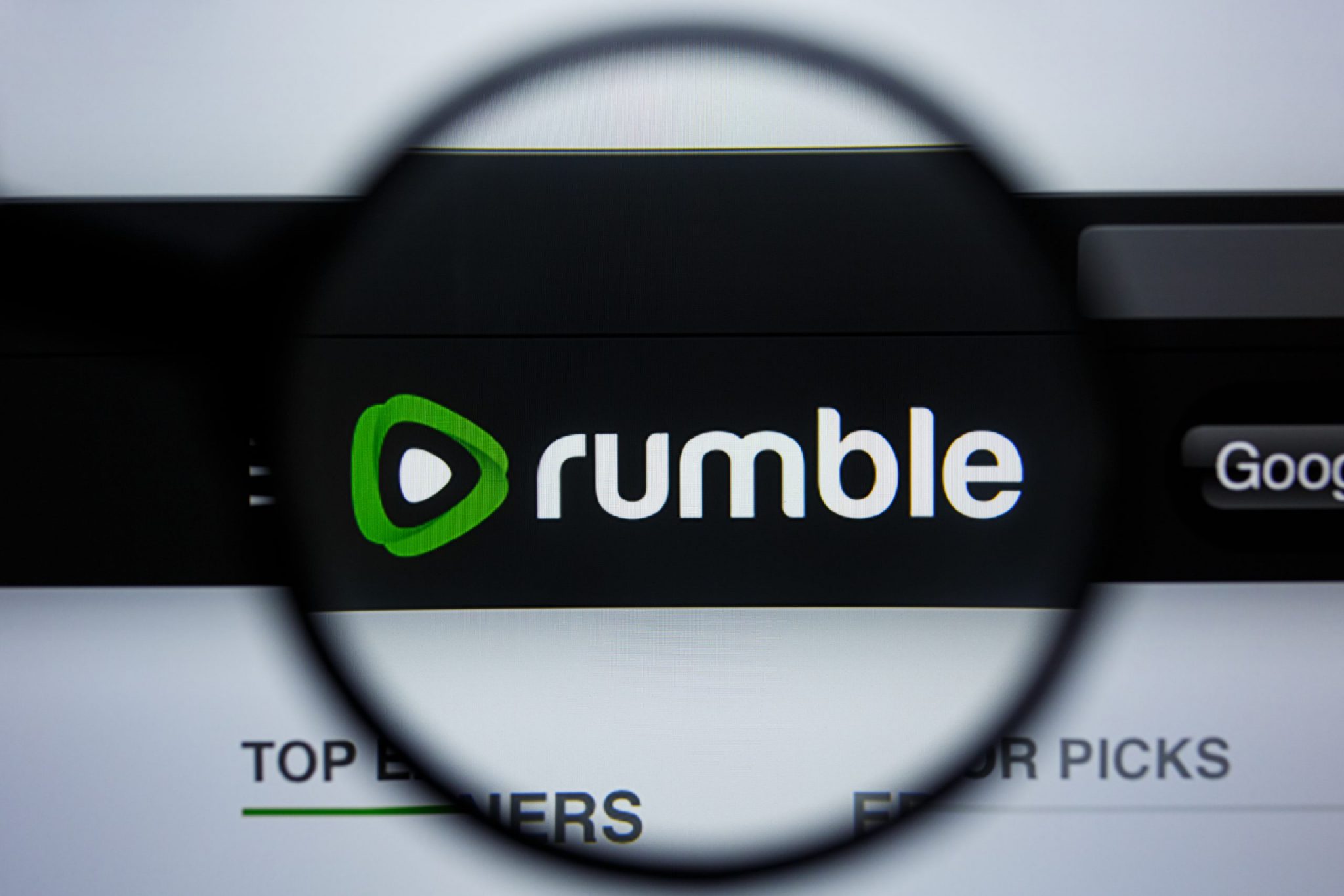The Midterm Monitor is an interactive tool that provides a snapshot of social media messages and narratives shaping the conversation around voting and election administration in the leadup to the 2022 midterm elections. The Midterm Monitor tracks social media posts for a subset of candidates for office, news outlets, and other key messengers. Learn more.
This week, the Midterm Monitor Report covers how candidates talk about election and foreign interference, looks at Ukraine support among candidates, provides a snapshot of the new Rumble page of the monitor, and dives into the battleground state of Georgia. A few takeaways:
- Candidates on foreign and election interference: The conversation about “meddling” and “interference” is limited among candidates. When it is mentioned, accusations of election interference are focused on domestic actors, not foreign actors.
- Candidates on Ukraine support: While present, overt promotion of pro-Kremlin positions on Ukraine was a minority viewpoint among candidates. Opposition to US support for Ukraine was far more mainstream and, judging by engagement metrics, popular. Nine of the ten most retweeted tweets mentioning Ukraine from monitored accounts between July 1 and October 11 were posted by isolationist voices in the Republican Party and opposed supporting Ukraine’s war effort.
- Snapshot of Rumble: True to its reputation, Rumble (added to the Midterm Monitor last week) is almost exclusively used by conservative candidates and media: Of the 34 monitored candidates with channels on Rumble, 31 are affiliated with Republicans and three are affiliated with independent or third-party conservative candidates. And of the 29 monitored media outlets or pundits with channels on the platform, 27 would be classified as right-leaning or far-right. (The outliers are Reuters and Newsy).
- Georgia: The investigation into the alleged breach of voting equipment in Coffee County, Georgia was also the subject of at least 40 tweets from local news outlets and 20 tweets from traditional, national news outlets, but it received little mention from conservative outlets and pundits—including those most active in covering election administration and election security concerns.
Candidates Cover Election Interference but Not Foreign Interference
With the understandable focus on domestic and insider threats to the midterms, conversations about potential foreign interference in the midterms have been largely absent—especially among candidates. While those who are talking about interference point to domestic actors, the total number of tweets referencing any kind of meddling or interference is relatively small. Since July 1, there have been 22 relevant tweets from monitored candidates mentioning variations of the terms “election” and “meddling,” 75 relevant tweets mentioning “election” and “interference,” and only two relevant tweets mentioning “foreign” and “interference.” Removing three tweets that appeared in multiple search queries, there were 98 tweets referencing the possibility of meddling or interference in elections, yet only five of those tweets referenced, in general or specific terms, foreign threats to US elections. (Several tweets referenced Russian interference or meddling either dismissively or tangentially and were thus determined to be focused on non-foreign threats).
Democratic candidates were responsible for all five mentions of foreign threats, with two tweets mentioning the general threat of foreign interference, two tweets focused on prior instances of Russian interference, and one accusing OPEC of election interference due to their recent decision to cut oil production. Still, foreign actors were identified as the primary threat in only one-third of relevant Democrat tweets (5 of 15), with the majority of tweets about election interference or meddling focused on Republicans as the primary threat.
Of the 32 tweets from monitored Republican candidates mentioning meddling or election interference, 31 focused on Democrats, Big Tech, the FBI, or some combination of the three.
None mentioned foreign adversaries, except to dismiss documented Russian meddling as a red herring for “actual” interference. Only one tweet—from Ohio Secretary of State Frank LaRose—referenced good faith efforts to combat election interference.
Of the 49 relevant tweets from Independents and other candidates, 42 came from one candidate, Kerry Rahen (I-VT), who repeatedly accused a state’s attorney of election interference in what appears to be a personal vendetta. Of the other seven relevant tweets, four focused on allegations of US meddling in foreign elections.
Unsurprisingly, this was the dominant theme in election interference posts from monitored Chinese, Iranian, and Russian accounts. Of the 31 tweets from monitored foreign actors mentioning “election” and “interference,” ten focused on allegations of US interference abroad.
Opposition to Support for Ukraine Strong Among A Vocal Minority of Candidates
While there has been broad bipartisan support for supporting Ukraine in its fight against Russian aggression, the candidates who tweeted most often about Ukraine—and the tweets that received the most engagement—were decidedly anti-Ukrainian, or at least opposed to continued support for Ukraine.
Between July 1 and October 11, there were 1,625 tweets mentioning Ukraine or Ukrainians from monitored candidates, with monitored Democratic candidates mentioning the country or its people almost twice as often as their Republican counterparts (786 Democratic tweets versus 402 Republican tweets). But those figures are skewed by a few hyper-active tweeters, most notably Kentucky Democratic House candidate Geoff Young, whose 534 Ukraine-related tweets represent roughly one-third of the total candidate mentions of Ukraine during the studied period. Young’s tweets are uniformly and vehemently anti-Ukrainian, including 193 tweets referencing Nazis in Ukraine. He has routinely shared pro-Kremlin disinformation, including doctored images, and, on multiple occasions, has retweeted Kremlin-funded media figures and Russian diplomats. While Young represents an outlier among monitored Democratic candidates—of 50 Ukraine-related tweets from Democratic candidates manually coded by analysts, Young’s tweets were the only ones coded as pro-Russian or anti-Ukrainian—he was not an outlier among other candidates who mentioned Ukraine the most often.
On the GOP side, Eric Jonathan Brewer, a House candidate in Ohio, mentioned Ukraine the most often in the studied period. Of his 77 tweets mentioning Ukraine or Ukrainians, 18 mentioned Nazis. Brewer also suggested that flying Ukrainian flags in the United States should be against the law, accused the Vindman brothers of being “alien infiltrators,” and blamed Hunter Biden for the war.
Despite the prolific tweeting habits of both candidates about the war in Ukraine, it is important not to overstate their influence. While Young has a modest following on Twitter (15,200 followers), Brewer does not (190 followers). And neither candidate is expected to be competitive in their respective elections.
But while overt promotion of pro-Kremlin positions was a minority viewpoint, opposition to US support for Ukraine was far more mainstream and, judging by engagement metrics, popular.
Nine of the ten most retweeted tweets mentioning Ukraine from monitored candidates during the studied period were posted by isolationist voices in the Republican Party and opposed supporting Ukraine’s war effort. Seven of those tweets came from three sitting members of the US House, all of who have substantial social media followings.

Top 10 tweets from monitored candidates mentioning Ukraine between July 1 and October 11, 2022.
The Rumble Echo Chamber
Last week, Rumble—the video hosting platform popular with conservatives—was added to the Midterm Monitor. True to its reputation, the platform is almost exclusively used by monitored conservative candidates and media: Of the 34 monitored candidates with channels on Rumble, 31 are affiliated with Republicans and three are affiliated with independent or third-party conservative candidates. And of the 29 monitored media outlets or pundits with channels on the platform, 27 would be classified as right-leaning or far-right. (The outliers are Reuters and Newsy).
But while Rumble has provided sizable audiences for conservative media—the top seven channels affiliated with monitored outlets or pundits all registered more than 1 million views in a 30-day period between September 8 and October 7—conservative candidates have made little use of the platform. Less than 7 percent of all monitored Republican candidates have an active channel on Rumble, and of the 31 GOP candidates who have a channel, more than half (18) did not post a single video during the studied period. Combined, Republican candidates only posted 121 total videos on Rumble between September 8 and October 7—far fewer than the 783 videos Republican candidates posted to YouTube. Candidates also struggled to generate much engagement or views, with only three candidates (Marjorie Taylor Green, Mark Finchem, and Elise Stefanik) receiving more than 10,000 combined views during the studied period.
The less restrictive content moderation on the platform did seem to invite candidates to post content that might possibly run afoul of content moderation on other platforms, particularly YouTube. For example, Mark Finchem, the Republican candidate for secretary of state in Arizona, posted an interview with Steve Bannon’s War Room, a channel that YouTube banned in 2021. And the Republican secretary of state candidate in Michigan, Kristina Karamo, posted a series of videos entitled “Benson’s Dirty Deeds,” in which she accuses her opponent, current Michigan Secretary of State Jocelyn Benson, of ignoring, mishandling, or orchestrating voter fraud. With titles such as “Ballot Mules,” “Zuckerbucks,” and “Dead Voters,” Karamo’s series embraces voter fraud narratives that, at least in a few cases, would likely violate YouTube’s election misinformation policies. (Karamo does not have a YouTube channel).
Finally, Rumble also hosts two Russian state media outlets—RT and Sputnik Radio’s Fault Lines—that were banned by YouTube in the wake of Russia’s invasion of Ukraine. Unsurprisingly, the war in Ukraine was the overwhelming focus of both channels, with little content, and almost no election related content, focused on the United States.
Battleground State Deep Dive: Georgia
Each week, we’ll take a closer look at the key influencers and narratives in one of our ten battleground states. This week, we turn to Georgia.
Most Influential Candidates on Social Media
As has been the case with previously reviewed states, races with an election denier—particularly one prominent on social media—translated into high engagement for both the denier and their opponent. Between September 8 and October 7, Rep. Marjorie Taylor Green, the lightning rod congresswoman with more than 1 million followers on Twitter and nearly a half million on Facebook, ranked as the most engaged-with Georgia candidate on Twitter and the second most reacted-to page on Facebook. Green also had all ten of the most retweeted tweets from monitored Georgia GOP candidates during the studied period, and she had by far the most viewed Rumble channel of any monitored account nationwide. But her opponent, Marcus Flowers, also benefited from her popularity, or notoriety as the case may be, ranking as the second most retweeted Georgia candidate on Twitter.
In a departure from other monitored battleground states, the secretary of state race between Republican Brad Raffensberger and Democrat Bee Nguyen did not generate high engagement compared to other key races in Georgia. Raffensberger is not active on social media and, as one of the few GOP secretary of state candidates in monitored battleground states to fully accept the results of the 2020 election, perhaps inspires less interest in his opposition. (Nguyen had the seventh most retweeted Twitter account among monitored candidates.)

The most influential Twitter accounts affiliated with monitored candidates in Georgia between September 7 and October 8, rank ordered by retweets.

The most influential Facebook pages affiliated with monitored candidates in Georgia between September 7 and October 8, rank ordered by reactions.
Voting Equipment Breach in Coffee County
In August, reports surfaced that Trump supporters, under the direction of Trump attorney Sidney Powell, allegedly copied a trove of sensitive Georgia election files in Coffee County after the 2020 presidential election. Those reports were later corroborated by video evidence showing a Republican county official—who was part of the fake elector scheme—and Trump-affiliated operatives inside a restricted area of the Coffee County elections office, where they had access to voting equipment. In response, Republican Secretary of State Brad Raffensberger ordered voting equipment to be replaced in the county.
The Coffee Country story was covered extensively by local news outlets, with at least 40 tweets dedicated to the investigation. The investigation was also the subject of at least 20 tweets from traditional, national news outlets, but it received little mention from conservative outlets and pundits—including those most active in covering election administration and election security concerns. The story was covered by Fox News, though the Coffee County breach was somewhat buried beneath a headline reading “Computer experts, election security experts warn of ‘serious threat’ to Georgia voting machines,” where concerns about Dominion voting machines were highlighted before coverage of the alleged Coffee County breach.
The views expressed in GMF publications and commentary are the views of the author alone.





